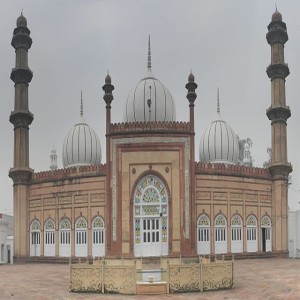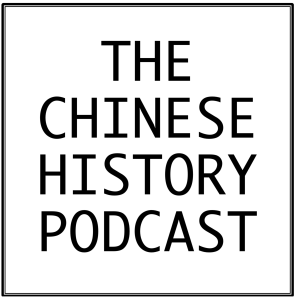
Rediscovering and Reconnecting: The Intellectual Exchange of Hui Muslims in the 19th and 20th Centuries
 2022-03-13
2022-03-13
In the study of 19th and 20th century Chinese history, there is often focus on the intense Christian missionary activities happening in China. Yet at the same time, members of China's Hui (or Sino-Muslim) community were also beginning to reconnect with their co-religionists overseas. Armed with knowledge of Arabic, Persian, and Urdu and trained in Western orientalist discourses in new religious schools overseas, these Hui scholars began to "rediscover" aspects of Islam and in the process rewrite the history of Islam in China both for audiences within China and for a non-Chinese audience overseas. In this episode, we are joined by Professor Nile Green of UCLA to talk about how and why these exchanges took place and some of the implications of these exchanges.
Please also be sure to check out Professor Green's podcast "Akbar's Chamber" for monthly episodes on the history of Islam. Available on Apple Podcasts and all other major podcast platforms.
Contributors
Professor Nile Green
Professor Nile Green is a Professor of History and the Ibn Khaldun Endowed Chair in World History at UCLA. He works on the Islamic history of Asia, the Middle East, Africa and Europe, publishing numerous monographs and articles and editing seven books on a wide range of topics related to the history of Islam. His recent research interest is on the global history of Islam and Muslims, focusing on intellectual and technological interchange between Asia and Europe; Muslim global travel writings; the transnational genealogy of Afghan modernism; and the world history of 'Islamic' printing. He was a founding director of UCLA's Program on Central Asia and serves on many association and editorial boards. He is also the host of Akbar’s Chamber, a podcast that offers a non-political, non-sectarian and non-partisan space for exploring the past and present of Islam.
Yiming Ha
Yiming Ha is a Ph.D. candidate in the Department of History at the University of California, Los Angeles. His current research is on military mobilization and state-building in China between the thirteenth and seventeenth centuries, focusing on how military institutions changed over time, how the state responded to these changes, the disconnect between the center and localities, and the broader implications that the military had on the state. His project highlights in particular the role of the Mongol Yuan in introducing an alternative form of military mobilization that radically transformed the Chinese state. He is also interested in military history, nomadic history, comparative Eurasian state-building, and the history of maritime interactions in early modern East Asia. He received his BA from UCLA and his MPhil from the Hong Kong University of Science and Technology.
Credits
Episode no. 9
Release date: March 13, 2022
Recording location: Los Angeles, CA
Bibliography courtesy of Professor Green
Images
Cover Image: Masjid at the Aligarh Muslim University (formerly Muhammadan Anglo-Oriental College) in Aligarh, Uttar Pradesh, India. It was founded by Sir Thomas Arnold and was (and still is) a major center of Islamic learning (Image Source).
A view of the Darul Uloom Nadwatul Ulama in Lucknow, India, an Islamic seminary where Hai Weiliang* studied (Image Source).
Sir Thomas Walker Arnold (1864-1930), a renowned British orientalist and Islamic scholar who wrote the famous The Preaching of Islam and The Encyclopedia of Islam. He founded the Muhammadan Anglo-Oriental College (now Aligarh Muslim University) and taught Syed Sulaiman Nadvi, who was the teacher of Hai Weiliang (Image Source).
Syed Sulaiman Nadvi (1884-1953), the teacher and educational patron of Hai Weiliang (Image Source).
* Sadly, no pictures of Hai Weiliang can be found.
References
Green, Nile. How Asia Found Herself: A Story of Intercultural Understanding. New Haven: Yale University Press, forthcoming 2022.
Benite, Zvi Ben-Dor. The Dao of Muhammad: A Cultural History of Muslims in Late Imperial China. Cambridge, MA: Harvard University Asia Center, 2005.
Benite, Zvi Ben-Dor. “Taking ʿAbduh to China: Chinese-Egyptian Intellectual Contact in the Early Twentieth Century.” In James Gelvin and Nile Green (eds.), Global Muslims in the Age of Steam and Print, edited by James Gelvin and Nile Green, 249-267. Berkeley: University of California Press, 2014.
Chen, John. “‘Just Like Old Friends’: The Significance of Southeast Asia to Modern Chinese Islam.” SOJOURN: Journal of Social Issues in Southeast Asia 31, no. 3 (2016): 685–742.
Chen, John. “Islam’s Loneliest Cosmopolitan: Badr al-Din Hai Weiliang, the Lucknow-Cairo Connection, and the Circumscription of Islamic Transnationalism.” ReOrient: The Journal of Critical Muslim Studies 3/2 (2018): 121-139.
Chung, Tan & Ravni Thakur (eds). Across the Himalayan Gap: An Indian Quest for Understanding China. New Delhi: Indira Gandhi National Centre for the Arts, 1998.
Henning, Stefan. “God’s Translator: Qu’ran Translation and the Struggle over a Written National Language in 1930s China.” Modern China 41, no. 6 (2015): 631-655.
Jahn, Karl. China in der islamischen Geschichtsschreibung. Vienna: Österreichischen Akademie der Wissenschaften, 1971.
Lipman, Jonathan N. Familiar Strangers: A History of Muslims in Northwest China. Seattle: University of Washington Press, 1997.
Mao, Yufeng. “A Muslim Vision for the Chinese Nation: Chinese Pilgrimage Missions to Mecca during World War II.” The Journal of Asian Studies 70, no. 2 (2011): 373–395.
Murata, Sachiko. “The Muslim Appropriate of Confucian Thought in Eighteenth-Century China.” Comparative Islamic Studies 7, no. 1-2 (2012): 13–22.
O’Sullivan, Michael. “Vernacular Capitalism and Intellectual History in a Gujarati Account of China, 1860–68.” The Journal of Asian Studies 80, no. 2 (2021): 267–292.
Park, Hyunhee. Mapping the Chinese and Islamic Worlds: Cross-Cultural Exchange in Pre-Modern Asia. Cambridge: Cambridge University Press, 2012.
Petersen, Kristian. Interpreting Islam in China: Pilgrimage, Scripture, and Language in the Han Kitab. Oxford: Oxford University Press, 2017.
Sen, Tansen. India, China, and the World: A Connected History. Lanham: Rowman & Littlefield, 2017.
Thum, Rian. The Sacred Routes of Uyghur History. Cambridge MA: Harvard University Press, 2014.
More Episodes
Create your
podcast in
minutes
- Full-featured podcast site
- Unlimited storage and bandwidth
- Comprehensive podcast stats
- Distribute to Apple Podcasts, Spotify, and more
- Make money with your podcast
It is Free
- Privacy Policy
- Cookie Policy
- Terms of Use
- Consent Preferences
- Copyright © 2015-2024 Podbean.com






